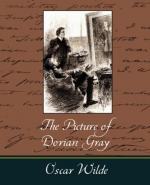CHAPTER XI
[...81] He passed out of the room, and began the ascent, Basil Hallward following close behind. They walked softly, as men instinctively do at night. The lamp cast fantastic shadows on the wall and staircase. A rising wind made some of the windows rattle.
When they reached the top landing, Dorian set the lamp down on the floor, and taking out the key turned it in the lock. “You insist on knowing, Basil?” he asked, in a low voice.
“Yes.”
“I am delighted,” he murmured, smiling. Then he added, somewhat bitterly, “You are the one man in the world who is entitled to know everything about me. You have had more to do with my life than you think.” And, taking up the lamp, he opened the door and went in. A cold current of air passed them, and the light shot up for a moment in a flame of murky orange. He shuddered. “Shut the door behind you,” he said, as he placed the lamp on the table.
[82] Hallward glanced round him, with a puzzled expression. The room looked as if it had not been lived in for years. A faded Flemish tapestry, a curtained picture, an old Italian cassone, and an almost empty bookcase,—that was all that it seemed to contain, besides a chair and a table. As Dorian Gray was lighting a half-burned candle that was standing on the mantel-shelf, he saw that the whole place was covered with dust, and that the carpet was in holes. A mouse ran scuffling behind the wainscoting. There was a damp odor of mildew.
“So you think that it is only God who sees the soul, Basil? Draw that curtain back, and you will see mine.”
The voice that spoke was cold and cruel. “You are mad, Dorian, or playing a part,” muttered Hallward, frowning.
“You won’t? Then I must do it myself,” said the young man; and he tore the curtain from its rod, and flung it on the ground.
An exclamation of horror broke from Hallward’s lips as he saw in the dim light the hideous thing on the canvas leering at him. There was something in its expression that filled him with disgust and loathing. Good heavens! it was Dorian Gray’s own face that he was looking at! The horror, whatever it was, had not yet entirely marred that marvellous beauty. There was still some gold in the thinning hair and some scarlet on the sensual lips. The sodden eyes had kept something of the loveliness of their blue, the noble curves had not yet passed entirely away from chiselled nostrils and from plastic throat. Yes, it was Dorian himself. But who had done it? He seemed to recognize his own brush-work, and the frame was his own design. The idea was monstrous, yet he felt afraid. He seized the lighted candle, and held it to the picture. In the left-hand corner was his own name, traced in long letters of bright vermilion.
It was some foul parody, some infamous, ignoble satire. He had never done that. Still, it was his own picture. He knew it, and he felt as if his blood had changed from fire to sluggish ice in a moment. His own picture! What did it mean? Why had it altered? He turned, and looked at Dorian Gray with the eyes of a sick man. His mouth twitched, and his parched tongue seemed unable to articulate. He passed his hand across his forehead. It was dank with clammy sweat.




